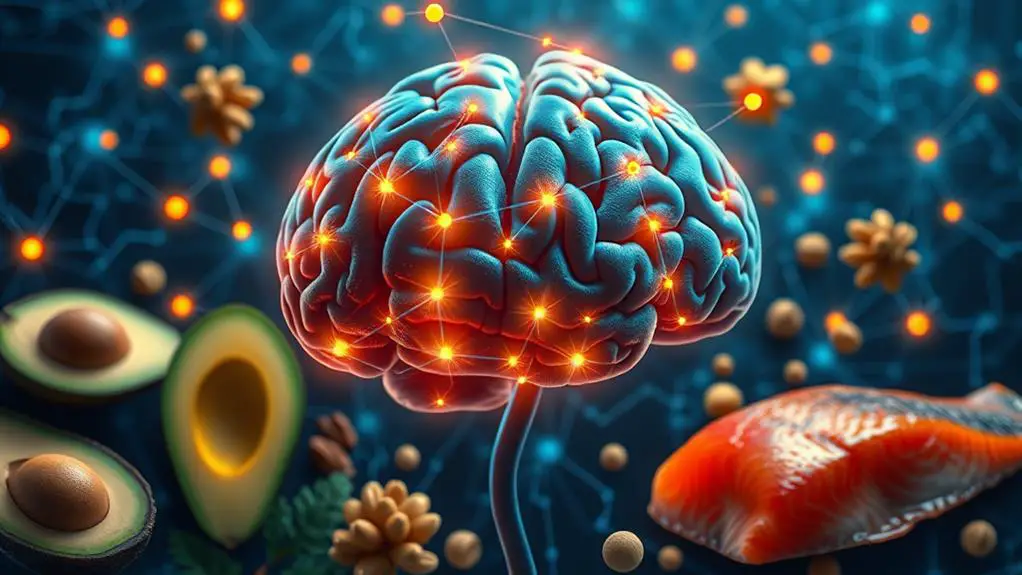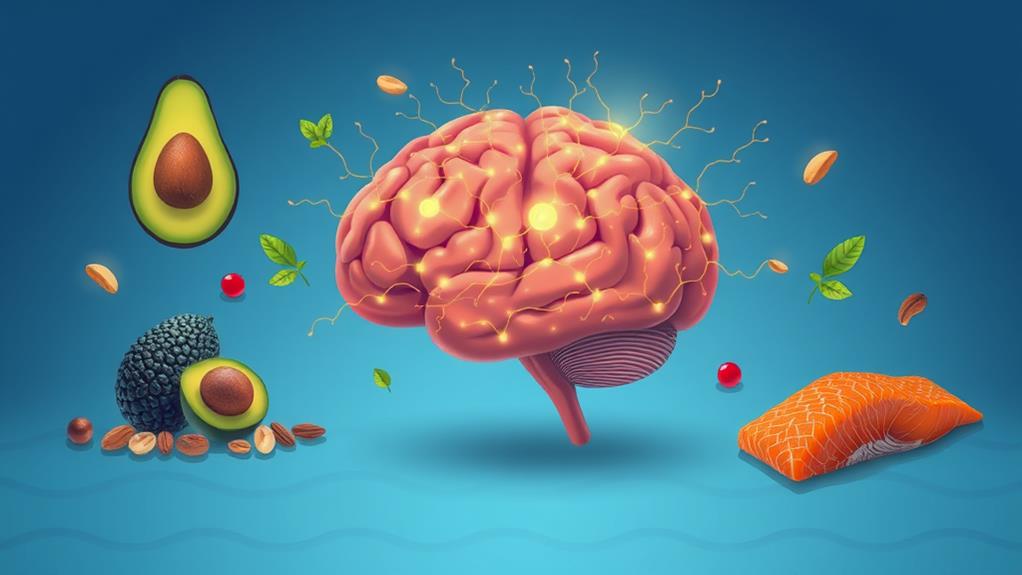
The keto diet, famous for its very low-carb, high-fat approach, isn't just about weight loss—it might help your brain too! People with serious mental health issues like schizophrenia and bipolar disorder saw big improvements after sticking to this diet. Imagine losing weight and feeling happier—pretty cool, right? By switching the brain's fuel from glucose to ketones, this diet might reduce brain stress and inflammation. Yet, it's tough to stick with, and there's still a lot to learn. Curious to hear what else the keto diet can do for your mind and body? Buckle up and follow along!
Key Takeaways
- The ketogenic diet showed a 31% average improvement in psychiatric symptoms over four months in a Stanford Medicine study.
- Participants reported enhanced mood, fewer depressive episodes, and overall better mental well-being, particularly in bipolar disorder cases.
- The diet may reduce oxidative stress and neuroinflammation, contributing to its positive effects on mental health.
- Increased GABA levels from the diet potentially stabilize mood and cognitive function.
- Nutrient deficiencies are a risk with the ketogenic diet, necessitating careful monitoring and possible supplementation.
Study Overview
A pilot study by Stanford Medicine examined the effects of a ketogenic diet on individuals with severe mental illnesses, including schizophrenia and bipolar disorder, who were concurrently undergoing antipsychotic treatment.
This study involved 21 adult participants, mainly white (76%), with an average age of 43 years. Most of these participants had metabolic issues, such as insulin resistance, which made them perfect candidates to see how diet could impact their health.
The participants followed the ketogenic diet for four months. The diet consisted of about 10% carbohydrates, 30% protein, and 60% fat. They focused on eating whole, non-processed foods, without worrying about counting calories.
This study wasn't just about numbers and percentages, though; it was about real people with real struggles.
Participant demographics revealed a group that was diverse in some ways but shared common dietary preferences and health challenges.
The results were pretty exciting! Fourteen participants fully stuck to the diet and saw significant improvements. They had fewer metabolic issues, lost weight, and felt better mentally.
In fact, three-quarters of them reported meaningful psychiatric improvements. This shows the potential power of dietary choices in managing severe mental illnesses.
Dietary Intervention Details
The ketogenic diet used in the Stanford Medicine pilot study was made up of about 10% carbohydrates, 30% protein, and 60% fat, emphasizing whole, non-processed foods without counting calories.
To guarantee participants stuck to this diet, their blood ketone levels were measured every week, revealing that 14 of the 21 adults fully adhered while 6 were semi-adherent and 1 did not stick to the diet at all.
This careful tracking helped researchers see the significant improvements in both metabolic and mental health among the participants.
Macronutrient Composition Breakdown
In stark contrast to standard dietary recommendations, the ketogenic diet implemented in the study was composed of approximately 10% carbohydrates, 30% protein, and 60% fat. These macronutrient ratios are quite different from the usual high-carb, low-fat advice most people follow. But here, the focus was on whole, non-processed foods, and there were no calorie restrictions! Imagine that—eating bacon, avocados, and nuts without counting calories.
Here's the breakdown concisely:
| Macronutrient | Standard Diet (%) | Keto Diet (%) |
|---|---|---|
| Carbohydrates | 45-65 | 10 |
| Protein | 10-35 | 30 |
| Fat | 20-35 | 60 |
Participants followed this diet for four months and weren't just guessing if they were doing it right. Weekly blood ketone level measurements helped guarantee they stuck to the plan. And wow, did it pay off! They lost an average of 10% of their body weight, saw their waistlines shrink, and improved their overall metabolic health dramatically.
To put it simply, the diet worked wonders for those who followed it. None of the participants met the criteria for metabolic syndrome by the end of the study. That's a huge win in my book!
Adherence Tracking Methods
Guaranteeing that participants adhered to the ketogenic diet was paramount to the study's success. The researchers faced several adherence challenges, but they employed effective tracking technologies to monitor compliance. Each week, participants' blood ketone levels were measured to guarantee they maintained the diet's strict macronutrient composition of 10% carbohydrates, 30% protein, and 60% fat. This method provided a quantifiable way to verify if participants were in a state of ketosis.
Out of the 21 participants, 14 fully adhered to the diet, 6 semi-adhered, and only 1 was non-adherent. The adherence tracking revealed that the majority of participants managed to follow the dietary plan, which emphasized whole, non-processed foods and did not impose any calorie restrictions.
Participants' successes were highlighted by significant health improvements, including an average weight loss of 10% and reductions in waist circumference. Moreover, none of the participants met the criteria for metabolic syndrome after four months, underscoring the diet's effectiveness when adhered to properly.
These results demonstrated that, despite the adherence challenges, the use of weekly blood ketone measurements as tracking technologies was pivotal in guaranteeing the study's success and the participants' health improvements.
Mental Health Improvements
A ketogenic diet has shown promising results in improving mental health, particularly for individuals with severe psychiatric conditions. In a pilot study at Stanford Medicine, participants experienced a 31% average improvement in psychiatric symptoms after four months on a ketogenic diet. This diet appears to enhance emotional resilience and mood stabilization, which are essential for mental well-being.
Three-quarters of the study's participants reported significant improvements in mood and overall life satisfaction. These changes are possibly due to the diet's ability to shift the brain's energy source from glucose to ketones, which may reduce oxidative stress and neuroinflammation. As a result, individuals experienced clearer thinking and fewer mood swings.
Anecdotal evidence suggests that people with bipolar disorder found notable benefits, including clearer moods and fewer depressive episodes. This emotional resilience helps them handle daily challenges better.
Participants also lost an average of 10% of their body weight, which can positively impact self-esteem and mental health.
It's fascinating to see how a dietary change can lead to such profound mental health improvements. While more research is needed, these initial findings are encouraging and offer hope for those struggling with severe psychiatric conditions.
Metabolic Health Benefits
The ketogenic diet has shown promising benefits for metabolic health, particularly in weight loss and the reduction of metabolic syndrome.
Participants in a study experienced an average weight loss of 10% and significant decreases in waist circumference, which helped eliminate metabolic syndrome in those initially affected.
These improvements in metabolic health also led to fewer psychiatric symptoms, suggesting a strong link between physical and mental well-being.
Weight Loss Outcomes
In a pilot study on the ketogenic diet, participants experienced an average weight loss of 10%, which markedly enhanced their metabolic health. This significant weight loss brought not just physical changes, but also a boost in weight loss psychology and diet motivation. People felt more driven to continue their healthy habits, encouraged by the visible and measurable results.
But the benefits didn't stop there. Waist circumference dropped by 11%, a clear sign that the body was responding positively. With slimmer waists, participants could feel the difference in their clothes and confidence levels.
These changes were more than skin-deep. They reported feeling more energetic and satisfied with life overall, which speaks volumes about the holistic impact of weight loss.
Imagine going from feeling sluggish and unhappy to energized and content. That's what these folks experienced! The numbers on the scale went down, and so did their blood pressure, body mass index, triglycerides, blood sugar levels, and insulin resistance.
All these improvements made them not just lighter, but healthier too. The study underlines how a ketogenic diet can be a powerful tool for achieving weight loss and better metabolic health.
Metabolic Syndrome Reduction
Participants in the pilot study not only experienced significant weight loss but also demonstrated remarkable improvements in metabolic health. Those on the ketogenic diet saw a reduction in metabolic syndrome, with none meeting the criteria after just four months. This diet led to an average 10% weight loss and an 11% reduction in waist circumference. Quite impressive, right?
But it wasn't just about shedding pounds. Participants also experienced decreases in blood pressure, body mass index, triglycerides, blood sugar levels, and insulin resistance.
These changes point to improved insulin sensitivity and metabolic flexibility, both vital for overall health. Imagine improving your health so much that conditions like metabolic syndrome just vanish!
Interestingly, at the start, 29% of participants met the criteria for metabolic syndrome. By the end, this dropped to zero. Zero!
Plus, those who stuck to the diet not only had better metabolic outcomes but also showed fewer psychiatric symptoms and better cholesterol levels. So, sticking to a ketogenic diet could be a game-changer for both your body and mind.
It's clear that the ketogenic diet offers more than just weight loss; it's a pathway to better metabolic health.
Mechanisms of Action

Switching to a ketogenic diet appears to positively influence mental health through several interconnected mechanisms. One key factor is neurotransmitter regulation. When you cut down on carbs, your body starts using ketones instead of glucose for energy. This switch can stabilize mood and sharpen cognitive function.
Plus, it boosts levels of GABA, a neurotransmitter that helps you feel calm and emotionally steady. Imagine it as flipping a switch from chaos to calm in your brain!
Another fascinating aspect is the gut microbiome. The ketogenic diet changes the bacteria in your gut, which can actually influence your behavior and stress levels. It's like having a secret garden in your stomach that affects how you feel every day.
Additionally, this diet can reduce neuroinflammation, which is linked to many mental health issues. Lower inflammation means a happier brain.
It also improves insulin sensitivity and blood glucose levels, and since blood sugar swings can make you feel all sorts of bad, keeping them stable is a big win.
Historical Context
Originally developed in the 1920s as a treatment for epilepsy, the ketogenic diet's historical roots highlight its longstanding medical relevance. Back then, doctors wanted to reduce seizure frequency by changing how the body gets its energy.
Fast forward to the 1970s, and the keto diet took on a new life. Thanks to Dr. Robert Atkins, it became super popular for weight loss, sparking a diet evolution that made keto a household name.
But that wasn't the end of keto's story. By the 1990s, celebrities and media outlets jumped on the bandwagon, making it even more famous. In fact, the ketogenic diet became the most googled diet trend in 2018! This historical significance shows just how much people love exploring new ways to stay healthy.
Over the past 20 years, scientists have been digging deeper into keto's benefits. They're not just looking at how it helps with metabolic health anymore.
Now, there's a lot of buzz about how it might help with mental health conditions. This shift is really exciting because it shows that people are starting to see how closely connected the brain and body really are.
Ketogenic Diets in Epilepsy

Exploring the ketogenic diet's role in epilepsy reveals a fascinating journey of medical innovation and patient care. Originally developed in the 1920s, this diet was a game-changer for seizure management, especially for those with drug-resistant epilepsy.
Imagine the relief of families when they discovered that a change in dietary history could greatly reduce seizures!
A 2021 Cochrane review provided amazing statistics: 55% of children on a ketogenic diet experienced complete seizure cessation. Even more impressive, 85% saw a reduction in seizure frequency.
How does it work? The magic lies in ketosis. By shifting the brain's fuel source from glucose to ketones, the diet offers an alternative energy supply, potentially improving brain function and reducing seizures.
Ongoing research is diving deeper into why this diet works so well for epilepsy. Scientists are looking at how it affects inflammation and neurotransmitters, but that's a topic for another time.
The historical success of the ketogenic diet in treating epilepsy has sparked curiosity about its benefits for other neurological and mental health conditions.
Inflammation and Neurotransmitters
Inflammation and neurotransmitters play pivotal roles in mental health, and the ketogenic diet may offer intriguing benefits in this domain. By providing an alternative fuel source, the ketogenic diet can reduce oxidative stress in the brain, leading to inflammation reduction. This is significant because neuroinflammation is linked to various mental health symptoms and conditions.
When inflammation decreases, the brain can function more efficiently, which may help alleviate some mental health issues.
The ketogenic diet also appears to influence neurotransmitter regulation. For instance, increased levels of gamma-aminobutyric acid (GABA), a neurotransmitter associated with the ketogenic diet, can contribute to mood stabilization and relaxation. This has a positive impact on mental health, making people feel calmer and less anxious.
Additionally, the diet's ability to improve insulin sensitivity can regulate neurotransmitter levels, enhancing mood and cognitive function.
Changes in the gut microbiome due to the ketogenic diet might also affect neurotransmitter production and the stress response, further impacting mental health outcomes.
Limitations and Risks

While the ketogenic diet has some short-term benefits, there isn't enough solid proof about its long-term effects on mental health.
People might face nutrient deficiencies and uncomfortable symptoms like "keto flu," which includes feeling tired and having stomach issues.
Plus, the results can vary a lot from person to person, making it hard to know if the diet will truly help everyone.
Insufficient Clinical Evidence
Evaluating the limitations and risks associated with the ketogenic diet for mental health reveals a significant gap in robust clinical evidence. This is largely due to research gaps and the quality of existing evidence. Most studies are small-scale and lack control groups, making their findings less reliable.
- Limited Studies: While epilepsy and weight loss show positive outcomes, high-quality clinical studies specifically focusing on mental health are scarce. This means we can't confidently say how effective the keto diet is for conditions like anxiety or depression.
- Individual Variability: People respond differently to the ketogenic diet. One person might feel great, while another might not see any mental health benefits. This unpredictability makes it hard to recommend keto for everyone.
- Potential Side Effects: The diet can have risks, like vitamin deficiencies and symptoms such as "keto flu." These side effects might make the diet not worth it for some people.
Moreover, there's concern about how sustainable the keto diet is. If someone stops following it, their mental health symptoms might come back.
We need more high-quality research to understand long-term effects and develop better guidelines.
Potential Nutrient Deficiencies
The restrictive nature of the ketogenic diet raises significant concerns about potential nutrient deficiencies, which could undermine both physical and mental health. Since the keto diet limits fruits, vegetables, and whole grains, you might miss out on key vitamins and minerals like fiber, vitamins A, C, K, and B vitamins. These nutrients are essential for keeping your brain and body in tip-top shape.
If you follow the keto diet for a long time, you could face these deficiencies, making you feel tired and messing with your digestion. For folks dealing with serious mental health issues, this can be extra risky since they might already have poor nutrition.
Here's a quick look at some important nutrients and how to keep them in check:
| Nutrient | Source in Keto Diet | Possible Supplementation |
|---|---|---|
| Fiber | Low-carb vegetables | Fiber supplements |
| Vitamin A | Leafy greens, liver | Multivitamins |
| B Vitamins | Meat, eggs | B-complex supplements |
To stay healthy, nutrient monitoring and dietary supplementation are vital. Checking your nutrient levels and adding supplements can help you avoid these pitfalls. Remember, a balanced diet is important, even when you're going low-carb.
Keto Flu Symptoms
Shifting to a ketogenic diet can often lead to what is commonly known as "keto flu," a collection of symptoms that some individuals may experience during the initial phase of dietary change.
These symptoms can include fatigue, headache, dizziness, nausea, irritability, and difficulty sleeping. They typically peak within the first week as the body adapts from using glucose to ketones for energy.
About 25% of people on the ketogenic diet report experiencing these symptoms, often aggravated by inadequate hydration or electrolyte imbalances.
While most keto flu symptoms are temporary, lasting just a few days to a week, they can be quite uncomfortable. This discomfort can deter some individuals from continuing the diet.
However, proper dietary planning and support can make a significant difference. Key strategies to mitigate these symptoms include:
- Keto flu remedies: Incorporating foods rich in electrolytes or taking supplements can help balance sodium, potassium, and magnesium levels.
- Hydration strategies: Drinking plenty of water and adding a pinch of salt to your diet can prevent dehydration and maintain electrolyte balance.
- Gradual adjustment: Easing into the ketogenic diet more slowly can give the body time to adjust, reducing the severity of symptoms.
Ketone Supplements
Ketone supplements have emerged as a popular tool for individuals seeking to achieve ketosis without adhering to the stringent dietary limitations of a traditional ketogenic diet. These supplements aim to boost ketone levels in the body, potentially offering the benefits of ketosis with fewer dietary changes.
However, ketone efficacy can vary widely among individuals due to differences in metabolism and response to supplements. This means what works for one person might not work for another, so it's not a one-size-fits-all solution.
When considering ketone supplements, supplement safety is a vital factor. Currently, no ketone supplements are approved for treatment or weight loss, and it's essential to use them under medical supervision to avoid potential side effects. These side effects can range from mild digestive issues to more serious health concerns, making it important to weigh the benefits against the risks.
Moreover, the impact of ketone supplements on mental health remains largely unexplored. While there is some speculation about their potential benefits, more research is needed to confirm these effects.
Until then, it's best to approach ketone supplements with caution and consult healthcare professionals before making any changes.
Future Research Directions

How can future research further elucidate the relationship between the ketogenic diet and mental health? To answer this, scientists are gearing up to design larger, more extensive studies. Collaborations with top institutions like the University of Michigan and Duke University are essential.
These future directions will help validate the ketogenic diet's effects on mental health and metabolic disorders.
Researchers are particularly interested in under-researched patient populations, like those with treatment-resistant mental illnesses. Focusing on these groups could reveal valuable insights into metabolic interventions.
To fully understand the ketogenic diet's potential, scientists emphasize the need to explore its long-term effects and sustainability. Current pilot studies show promising results, such as a 31% average improvement in mental illness severity.
However, randomized controlled trials are necessary to confirm these findings.
Here are three key areas needing attention:
- Long-term Effects: Investigate how sustainable the ketogenic diet is in managing psychiatric conditions over extended periods.
- Mechanisms of Action: Examine how the diet impacts brain health, especially regarding neuroinflammation and neurotransmitter regulation.
- Broad Patient Populations: Conduct studies on diverse groups, including those with hard-to-treat mental illnesses.
Medical Considerations
In moving from future research directions to practical applications, understanding the medical considerations of the ketogenic diet is imperative for its safe and effective use in mental health management. Medical supervision is vital because individual health conditions can influence the diet's effectiveness and safety. For example, if someone has gastrointestinal problems or a history of kidney stones, a keto diet might make these issues worse. This makes patient monitoring essential.
Let's not forget the dreaded "keto flu." This set of symptoms includes fatigue and digestive issues, which can make sticking to the diet really tough. Also, it's super important to avoid stopping any psychiatric medications suddenly when starting the keto diet, as this can cause symptoms to come back.
Nutritional deficiencies are another concern with long-term keto. Regular check-ups and dietary adjustments are necessary to guarantee you're getting all the vitamins you need.
| Medical Consideration | Importance |
|---|---|
| Gastrointestinal Problems | Careful monitoring is vital |
| "Keto Flu" Symptoms | Affects adherence and well-being |
| Nutritional Deficiencies | Requires regular assessments |
Frequently Asked Questions
Can Keto Affect Your Mental Health?
Yes, the keto diet can affect mental health. Keto benefits include enhanced mental clarity, cognitive function, and mood stabilization. Nutritional ketosis shifts the brain's energy to ketones, potentially improving brain energy and overall psychiatric conditions.
Is a Keto Diet Good for Anxiety?
The keto diet shows potential for anxiety relief due to its benefits in enhancing mood and stabilizing neurotransmitter levels. Research indicates that shifting to ketones as an energy source may mitigate anxiety symptoms and improve overall brain function.
Is a Keto Diet Good for Brain Health?
The ketogenic diet offers notable keto benefits for brain function, including improved cognitive performance and mood stabilization. By utilizing ketones as an alternative energy source, it may enhance brain health, reduce neuroinflammation, and support overall mental well-being.
Who Shouldn't Do Keto?
Individuals with certain medical conditions, dietary restrictions, or specific lifestyle factors—such as a history of eating disorders, metabolic disorders, chronic kidney disease, pregnancy, or breastfeeding—should avoid the ketogenic diet due to potential health risks and adverse effects.
Conclusion
The ketogenic diet shows promise for improving mental health and metabolic conditions through mechanisms like reduced inflammation and increased ketone production. However, more research is needed to fully understand its long-term effects and potential risks. While ketone supplements might offer additional benefits, they require further investigation. Future studies should address current limitations and explore broader applications of this dietary approach. Medical professionals must carefully consider individual patient needs before recommending a ketogenic diet.









No Comments